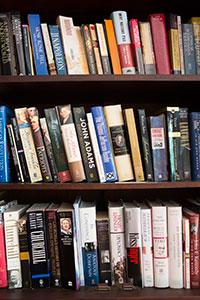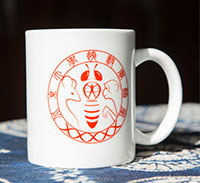The biologist who gave up US citizenship and returned to China

Simply sign up to the Life & Arts myFT Digest -- delivered directly to your inbox.
The neurobiologist Rao Yi had the ill fortune six years ago to buy a “rotten tail building”. In Chinese the phrase refers to a development that is left unfinished when the funds are embezzled. It was part of a sharp learning curve as Rao returned from the US, where he had worked for more than two decades, in a bid to further Chinese science.
On this bright morning in Beijing, as children play in padded coats under a tree nearby, it is hard to see any signs of rot. The quaint paved roads and sleepy porches in Rao’s gated compound, a 25-minute walk from Peking University, bear some resemblance to suburban America, although the red lanterns that hang from some of the doors are distinctly Chinese. Today, the site is calm and peaceful but Rao assures me that the developers behind the smart new complex are now serving time in prison for misappropriation of funds.
Here in China it is an all too common story. Rao paid for his four-bedroom house in 2007 but the money disappeared and the building works stalled. He had to wait a further four years to move in. “A lot of people went on protest,” says Rao, gesturing vaguely to his neighbours. “I did not because if I got involved, they thought it would be too much publicity. They said you can if you want but if you don’t it would be . . . ” he pauses, “ . . . nice.” Exactly who said this remains unclear. When probed, Rao waves his hands dismissively. “People called,” is all he will say.
That someone would want to silence Rao’s opinions is hardly a surprise given his high profile and outspoken views. In 2007 he made a decision that shocked his peers, giving up his position as head of a scientific institute at Northwestern University in Illinois to take up a post as dean of the School of Life Sciences at Peking University. Rao resigned as dean last September in an effort to set an example to other Chinese people who he believes “try to hold on to ‘official’ positions for too long”. However, he continues to work as a professor and as director of the McGovern Institute for Brain Research at the university.

In 2008 the Princeton molecular biologist Shi Yigong also chose his homeland over the US after rejecting a $10m research grant from the Howard Hughes Medical Institute and accepting a job as dean of life sciences at Beijing’s Tsinghua University.
Both Rao and Shi were driven by a sense of moral obligation to China and, for Rao, a desire to return home. “In most of the textbooks in middle school and high school [in China] we are still following Einstein – nothing Chinese,” says Rao. “At some point textbooks have to have some contribution from China, otherwise what is our value to the human race?”
Their homecoming appeared to herald a reverse of the Chinese brain drain that had led the best and brightest to seek work abroad. But Rao’s return has not been smooth. In 2010 Rao and Shi published a scathing editorial in Science magazine that confronted the misuse of research funds and corrupt cronyism that has plagued Chinese science, consigning much of it to mediocrity. “Rampant problems in research funding – some attributable to the system and others cultural – are slowing down China’s potential pace of innovation,” read a summary of the paper.

The paper’s claims were rebutted by the Ministry of Science and Technology (an institution Rao had previously recommended abolishing). In 2011 Rao was excluded from the list of preliminary candidates for new academicians in the Chinese Academy of Sciences, the country’s highest advisory body. “They decided to elect people who are far worse than us,” says Rao. “It’s very perverted.”
As bright light streams through the windows of the sunroom, such frustrations seem far away. Rao shares the house with his wife, also a scientist, and their teenage son, David (their daughter is studying in the US). “When Nobel laureates visit we feed them Chinese [dishes]. We have a helper at home. I’m very bad at cooking,” says Rao, pointing towards his modest dining room. Rao designed the Chinese-style interior of the house himself. He is most proud of the two large bookshelves packed with history books. “I put all the English books in the Chinese bookshelf and all the Chinese books in the modern bookshelf. That is what we are – a composite,” he says grinning.

After he returned to China, Rao renounced his US citizenship (although his children remain American). The decision largely rested on his unease following the aftermath of 9/11. “What [President George Bush] did was immoral . . . You cannot put people in Guantánamo Bay without trial,” he says.
“With Obama it is the same thing. That is a huge disappointment,” he continues. “It made me think, ‘Do I really want to live in the US forever or do I admit that I really belong to China?’ Yes, China has lots of problems, but on the other hand, that is where I belong and I can try in my small way to make it better.”
In attempting to make it better, Rao focuses on what he knows best: science. Articles on his blog can attract thousands of hits and he is aware that by being “outspoken I generate enemies but I also generate very strong supporters – they know what I stand for and don’t stand for”.
Science, Rao believes, is there either to push the frontier of human knowledge or to help a nation develop, and “for either of those, Chinese science is not up to the task”. Both the misuse of funds and fabrication of research is a problem. Chinese universities often give out cash prizes and benefits, including housing, based on the quantity, rather than the quality, of published work. (In 2009 Acta Crystallographica Section E, a UK-based journal, was forced to retract 70 papers by Chinese researchers who had used fake data).

Education in China constitutes another challenge. “Schools emphasise exams which are based on facts or answers that are already known. Students are not trained to think about the uncertainties and to tackle unknown questions. It does not encourage curiosity or innovation,” says Rao. At the heart of the matter is the cultural phenomenon of guanxi (or connections) that binds Chinese society together. “Everything you are doing is trying to make your parents happy, your neighbours happy, your superiors happy. You must disregard the opinions of others to be creative and to come up with the secrets no one knows,” says Rao.
His wonder of science is encapsulated in a row of photographs from space and models of rockets that line the top of his bookshelves. They are a reminder of the 1950s Chinese space programme. “He was a great Chinese scientist,” Rao says of Qian Xuesen, the leader of the programme, before shaking his head. No Chinese-born scientist has ever received a Nobel Prize for research in the mainland. “Every year Nobel Prizes are passed around, China feels a little awkward.”
It is time to go. As Rao stands on the porch, and pulls his Mandarin-collar jacket tighter around himself to fend off the cold, he makes a final comment about the uncertain future of science in China. “We will see,” he says with a hopeful smile, “eventually, we will contribute to the world.”
——————————————-
Favourite thing

Rao struggles when asked to choose a favourite object. He walks around listlessly picking things up and putting them back down. He studies his bookshelf, trying to choose his best-loved book. “I have so few objects,” he mutters. “A picture of my kids maybe?” He then decides that a real child will be better than a photo of one. He calls down his son David, who has been dozing upstairs. “Can David be one?” he asks, before realising that David is not an object, “I’m a very non-materialistic person.”
Eventually he settles on a white mug, a set of four, that he designed himself to represent his work in neurobiology. Red Chinese characters across the top spell out “Peking University” and it is decorated with an illustration of flies, mice, monkeys and humans, the subjects of his research.
Comments